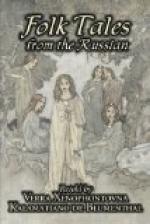Moujik, a peasant: his duties are those of a farm laborer, yet this phrase would not be a fair translation. This word, which is rendered “tiller of the soil,” has no exact equivalent in English.
Korolevitch, from korol: king. The endings evitch and evna show descent, korolevitch meaning son of a king; korolevna meaning daughter of a king.
Dutch trumpet, i.e., an imported trumpet. Anything foreign is “Dutch” to the Russian peasant.
Honey drink, a drink made by fermenting honey and water. It is quite common in Russia, and is about the same as our mead.
Russian and other Slavonic tales often have queer endings, similar to the one here given by the story-teller at the end of the story, which is no part of the tale. To the Russian they give a poetic touch, a little sense of confusion and mystery which is certainly delightful.
The Language of the Birds
Holy Russia. To the Russian his country is sacred; everything outside is profane by comparison. The phrase suggests the Holy Roman Empire of history, or the Celestial Kingdom of the Chinese.
Ivanoushka the Simpleton
In the peasant’s house there is often a large stove of brick or tile on which the family sleep in cold weather.
A day in and an equal day out, the Russian idiom. Observe how very like our own.
Woe Bogotir
Kabak, a drinking saloon.
The ruble is the principal coin of Russia, as the dollar is in the United States. It is equal to 100 copecks, and at this time (1903) is worth only about 50 cents.
Honey to drink, i.e., fermented honey, or mead.
Baba Yaga
Baba, a peasant woman, or grandmother; granny. Yaga, witch. Baba Yaga, therefore, is the familiar “Grandmother Witch.”
Izba, a hut. Izboushka, a tiny hut.
Father Frost
Schouba, a large fur-lined cloak.
Sarafan, the Russian national costume for women.
[Illustration]
[Illustration]



